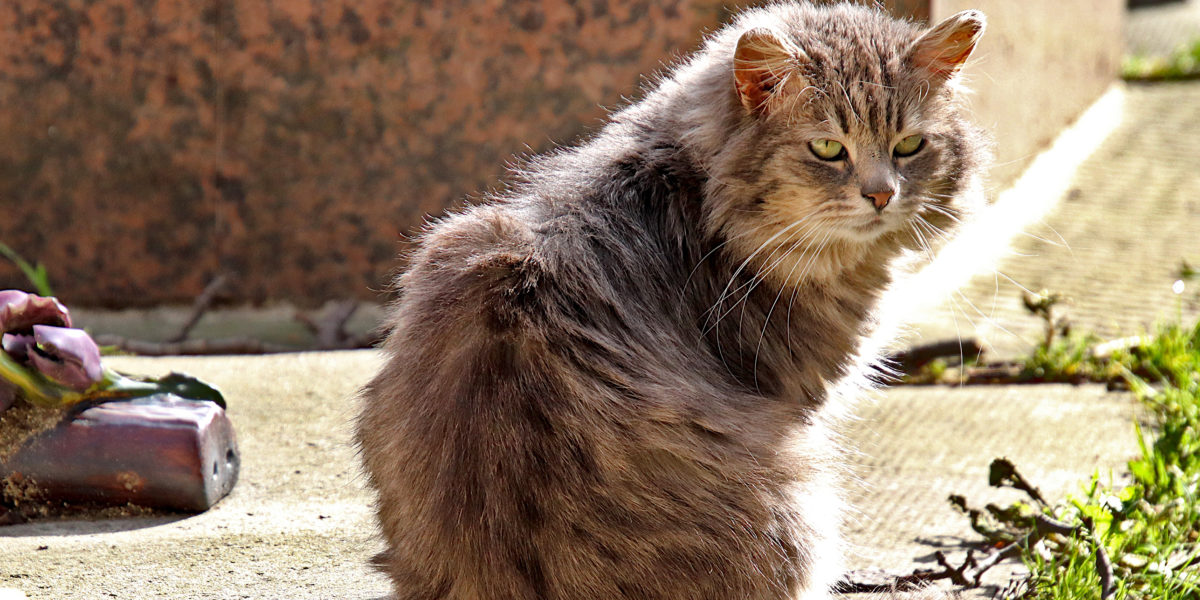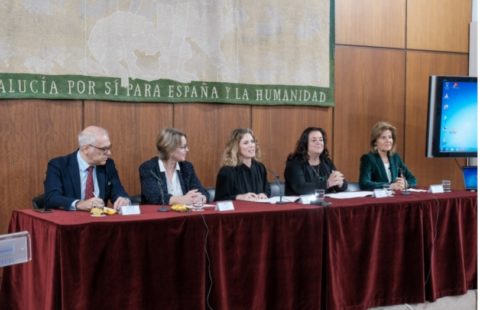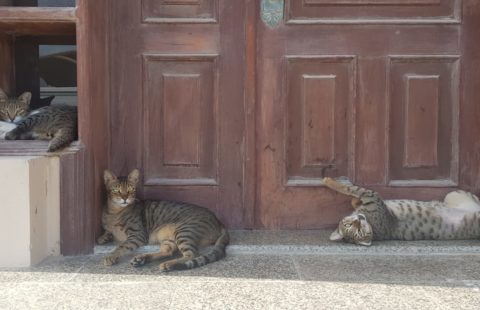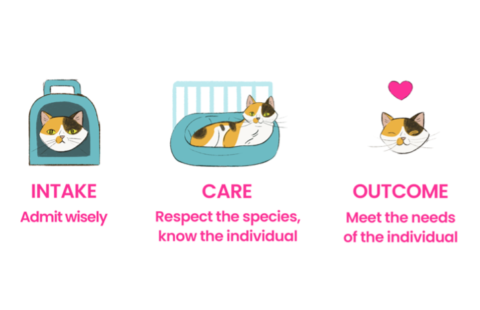The world is full of unsung heroes who tirelessly work to care for unowned cats. Marcela Velasco got in touch with us to tell us about the wonderful work of Martha Cantón at the Panteón Francés de San Joaquín, a cemetery in Mexico City.
Marcela visited the cemetery to interview Martha, and this is what she had to say…
Marcela: Martha, we are so interested in finding out how your work with unowned cats started, do you remember the first cat you helped?
Martha: Thank you so much for your interest in this large community of cats at the Panteón Francés de San Joaquín and about the labour we have been doing for all these years (15 years in 2022). Nowadays we feed around 150 cats, all neutered and vaccinated.
Our story begins while my sister Aurora was working as part of the staff at the cemetery and she realized that there were many feral cats living there…and as animal lovers, we started feeding them, as there was no program or organization in charge of supporting them.
We bought dry food and sometimes pouches for them and took them to a veterinarian not far from our neighborhood when we noticed [any] illness or pregnant females. At the time we had little knowledge of how fast they can reproduce, or about how people just abandon them with no regret. Whenever they were “adoptable” we found responsible homes to place kittens. Some adults could adapt to a house life, [but] most of them could not.
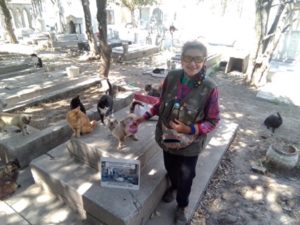
The first cat I met was “Mosh”. As we found it easier to organize ourselves to feed them by splitting the place in[to] different areas we gave his name to the “first area”, one of the closest to the entrance. In this “Mosh area” there were around 25 cats. Nowadays there are around 15 cats living there. From the very beginning, we have been giving names to each one of them, considering their characteristics and each one[‘s] particular personality.
Unfortunately, almost from the very beginning, we realized that there was no interest in helping the colony of cats in any way by the cemetery administration, moreover, strange things suddenly started to happen. Some of them were killed or disappeared and at the same time, we noticed that despite our efforts of giving medical support or neutering them (always by our own means) [that] the population kept on growing.
It was in 2014 that we met by [chance] a couple that was regularly visiting the cemetery and got interested in what was happening there. They wanted to help us, and they launched a campaign [on] change.org to make visible what was happening in the place. After getting around 30,000 signatures we finally got the attention of local authorities who engaged to make a long-term effort to neuter the whole community. The campaign ran for around 6-8 months. A mobile hospital was placed outside the cemetery twice a week and besides our three hundred community of cats, neighbours could also bring their cats to be neutered for free. Cats recovered from surgery in a public veterinarian hospital close by and they were [returned] back to their home at the cemetery after two or three days.
At the time the government changed, and the new representatives simulated to be interested in continuing the campaign but the only result we saw was the disappear[ance] of around a hundred cats, already neutered. Nothing else was possible [for us to do] and I just continued my labour keeping some evidence but with no legal support.
Marcela: Can you tell us a little bit about your situation locally – do you have any estimates of free-roaming unowned cat numbers?
Martha: There are not really [any] reliable numbers that I could share concerning unowned cats. In Mexico, there are more than 23 million dogs and cats, but [it is] estimated that around 70% do not have a home. We have a big problem of abandon[ment] too.
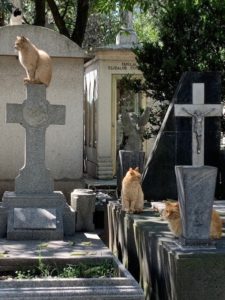
Marcela: Are there many people like you who feed them?
Martha: There are fortunately more people doing this labour independently, as I do at the French cemetery, and some other[s] in organized small groups or associations. Some of them [are] legally constituted and who rescue them from the streets giving them care in foster homes. There are also some young vets that attend newborn kittens in need of special care because they are found alone or have lost their Moms somehow.
Concerning other cemeteries, I know that at the “Panteón Español” also in Mexico City, there is an organized group including both a group of volunteers and the cemetery administration, supported by the Spanish Beneficence who gives the resources and medical attention for neutering and feeding feral cats. I do not know how many cats they support, but they are a smaller community than the one we feed at the Panteón Francés, working as an organized team.
There are also recognized associations and shelters that responsibly rescue, neuter and search for good homes for kittens and adult cats that eventually can adapt to a domestic life. Most people prefer to adopt kittens than adult cats.
For the community I care for, finding homes is a major challenge because most of them would not [allow] you to touch them and sadly could never find a home. [The] weather in Mexico City is fresh but sunny, so, they [don’t] suffer that much during the cold season. It is mainly during the rainy season that they have a difficult time finding secure places to protect themselves, but generally speaking, they have a peaceful life since they have been neutered, and live basically protected.
Marcela: Do you have good working relationships with your local veterinarians?
Martha: Regarding veterinarians’ assistance, we have not yet achieved to have a committed relationship with one. Of course, we have benefitted [from] good medical consultation and sometimes reductions in price, but we do not have a formal agreement that could guarantee a special rate for our cats and timely care for them. I think having someone that could come to the cemetery and take care of checking their general health condition on a periodical basis [would be beneficial].
Marcela: Do you work as part of a group?
Martha: Not at all. I started this labour with my sister, but she no longer works there and I am the one that comes every single day with my 18 kilos of “croquetas” in my small car. One day a week I have to come by foot, however, I keep a small cart inside the cemetery which some good workers store for those specific days.
Marcela: How do you raise funds?
Martha: Well, it has not been easy at all but little by little people started knowing about our labour, some stopping by when visiting the cemetery, some visiting our Facebook page, some others just by knowing us as friends or neighbours. So, fortunately, we get some “donativos” from people [on] a regular basis but, most of them do it only when they have the possibility. We are not an association so, besides our own resources, the donations we get are mainly in-kind donations. We also participate, by invitation, in several events a year organized by cat protectors who kindly share their donations with us. We have lots of fun too because during these events they organize activities and sell all kinds of things inspired [by] cats, everything to help the cause.
Marcela: Do you have any figures for the number of cats you and your vet team have neutered over the past 15 years?
Martha: Yes. In rough numbers we have neutered around 350 cats. A small amount of them found homes, [e]specially kittens.
Marcela: What is the situation like now with unowned cats in your area, compared to 15 years ago?
Martha: From heaven to earth. They live in peace, they also give peace to visitors and as long as they do not get hurt again they should just get [regular] veterinary [care] and they can continue to live happily at the cemetery. Since we had this great campaign, we are now more or less calm instead of in continuous preoccupation [with] getting more and more little ones coming. We need a lot of help and coordination still to achieve this, but it has been a great step.
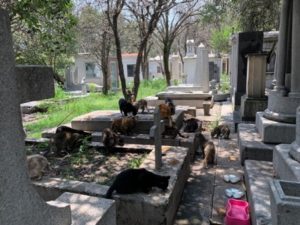
Marcela: What are the challenges for the future and what help do you need?
Martha: Well, it would really be of great help if we had one of these big brands of cat food [for example] Purina or [an]other good quality food [providing donations on] a regular basis or by giving us reduced prices, for instance, selling us the packages that are about to expire, (our kitties consume a lot!)
The other issue that we face and that would be a big help is to get regular medical attention, if possible at low or no cost, including neutering [when] we discover a new [cat]. We cannot do this successfully by ourselves without support. We need traps but also trained people who know how to handle them, and a vet that could be part of our team to come to the cemetery and find [a] way to check their health condition, [with] most of them being so difficult to handle.
We have had some difficult times since not everybody has the same way of thinking and education, but we do all this in the name of our love for them. I invest time and money which is not a small effort, but I will continue to do it gladly, they deserve our respect and it gives me a lot of satisfaction too.
I consider all of them incredible warriors and I feel honoured to be able to continue with this labour.
If you’d like to help support Marta and her inspirational work with unowned cats you can email her at: [email protected]
Visit her Facebook fan page:
https://www.facebook.com/Ayudemos-a-los-Gatos-del-Pante%C3%B3n-Franc%C3%A9s-1916568895239094/
Or donate to her Amazon wish list:



